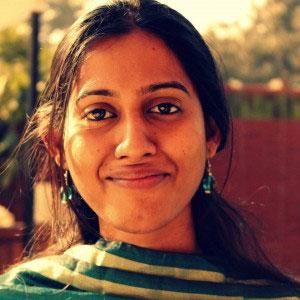I grew up as a confused teenager.
As I hit puberty, my sudden reproductive power juxtaposed with ostracization really baffled me. I grew up teased because I appeared to be a “malnourished” girl, even though I was completely healthy and simply skinny. I was blinded by skin whitening creams as I rubbed them repeatedly over my brown skin. I battled body image issues, and maneuvered around different isms, including many feminisms I encountered (and continue to encounter) in my life. And every time it was a sense of solidarity that kept me going.

A solidarity I felt with a certain experience, a certain struggle, a certain movement. Of course, at that time I hadn’t begun articulating the whole idea of solidarity and what it entails.
As I reflect back on my experiences as a girl and woman, and what living in a deeply patriarchal, prejudiced, sexist, racist, ableist and ageist society means, I wonder often about what influenced my [feminist] politics. Was it the ostracizing? The unjust beauty standards for women? The countless times I heard and lived stories of surviving violence?
These all added up. But the ability to look at different struggles and forms of oppressions and draw connections strengthened my feminism, as did my willingness to empathize (and not sympathize). These are all elements of “breaking the silos,” building solidarity and forming a sense of sisterhood.
As someone who identifies as a brown, sex positive, Indian feminist, I know the causes I am passionate about emerge from the context I belong to. I have consciously chosen to fight against certain injustices that affect me on a personal level. This doesn’t mean I dismiss struggles I don’t identify with directly, but alludes to the necessity to define our own activisms and determine how to best relate to those that aren’t primarily “ours.”
My feminist activism, for example, had never exposed me to environmentalists and their struggles.
My understanding of the impact of climate change on women was limited to books and articles. But through my work, I have begun to understand that seemingly remote causes are inextricably linked to the ones I claim as “mine.” Berta’s assassination shook me, as it did my feminist and environmentalist friends in the Latin America. I know that the struggle for her justice will only reach its true potential when everyone joins in. And solidarity helps render this “mine” versus “yours” activism obsolete.
In the midst of all the struggles we fight, the movements we build, the friendships and allies we make and the power structures we dismantle, building solidarity is one of the most important things we do to stay strong, motivated and fiery to continue our work. Our activisms often overlap and it is solidarity that exposes us to struggles we never thought existed or needed a space to grow.
Solidarity means recognizing the efforts of fellow feminist friends and allies and publicly appreciating their work.
It means being curious to learn more about the injustices that my fellow activists face. It means embracing someone’s struggle, as an ally or supporter, even if you haven’t experienced that particular form of oppression. It means stepping back and creating space for more marginalized voices to lead. It means learning to pause and reflect on all that we have accomplished together so far. And it also means taking care of ourselves and others so that we sustain ourselves to continue to show up for each other, until justice for all has been achieved.
I have now learned to find my balance amongst multiple identities, cultures, continents and contexts. I am now curious about countless, parallel movements happening in the remotest corners of the world by people as young and passionate as me. It has made me feel more responsible as a young feminist activist to recognize and amplify their work.

Deepa is a young feminist activist who has lived and explored her feminism in different cities in India. Her areas of interest include gender and media, gender and pop culture and feminist literature with a keen hunger for erotica. She is the Communications Officer at FRIDA | The Young Feminist Fund, a global youth-led fund focused exclusively on supporting young feminist organizing worldwide.
